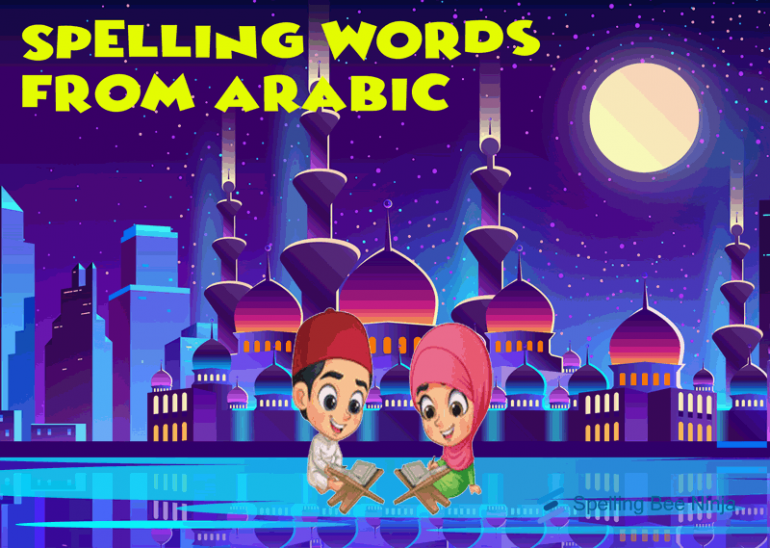The Arabic language is the world’s fifth most spoken language behind English, Chinese, Hindi and Spanish, and now, words from Arabic have made their way into your spelling bee word lists.
The Arabic language has such a strong linguistic presence all over the globe. Its presence is so widespread and powerful that it has an immense influence over the lexicology of Western European languages like French and English.
The English language is composed of different words and phrases that have been borrowed from the Arabic language. Our whole alphabet, from A to Z, from algebra, alchemy and albatross right through to zenith and zero, English vocabulary is composed of hundreds of words from Arabic origin.
You will find a lot of words from Arabic in different spelling bee word lists. Spelling bees like to incorporate words from different languages, origins, and culture. Hence, you are bound to run into one or more of these words at some point during your practice as well as during the competition.
PDF, Flashcards and SBN formats
 | > Arabic words in PDF Format |
 | > Arabic words FLASHCARDS in PDF Format |
 | > Arabic spelling words with our SBN APP |
Arabic Words List
Some definitions from Arabic Spelling List
Click on each word to see the related spelling bee word page on SBN (opens in a new browser tab).
| Adobe | An unburnt brick dried in the sun; also used as an adjective, as, an adobe house, in Texas or New Mexico. |
| Albatross | A web-footed bird, of the genus Diomedea, of which there are several species. They are the largest of sea birds, capable of long-continued flight, and are often seen at great distances from the land. They are found chiefly in the southern hemisphere. |
| Alcazar | A fortress; also, a royal palace. |
| Alchemy | An imaginary art which aimed to transmute the baser metals into gold, to find the panacea, or universal remedy for diseases, etc. It led the way to modern chemistry. – A mixed metal composed mainly of brass, formerly used for various utensils; hence, a trumpet. – Miraculous power of transmuting something common into something precious. |
| Alcove | A recessed portion of a room, or a small room opening into a larger one; especially, a recess to contain a bed; a lateral recess in a library. – A small ornamental building with seats, or an arched seat, in a pleasure ground; a garden bower. – Any natural recess analogous to an alcove or recess in an apartment. |
| Alfalfa | The lucern (Medicago sativa); — so called in California, Texas, etc. |
| Algebra | That branch of mathematics which treats of the relations and properties of quantity by means of letters and other symbols. It is applicable to those relations that are true of every kind of magnitude. – A treatise on this science. |
| Algorithm | The art of calculating by nine figures and zero. – The art of calculating with any species of notation; as, the algorithms of fractions, proportions, surds, etc. |
| Alim | An Islamic scholar well versed in Islamic/Shariah law and theology |
| Alkali | Soda ash; caustic soda, caustic potash, etc. – One of a class of caustic bases, such as soda, potash, ammonia, and lithia, whose distinguishing peculiarities are solubility in alcohol and water, uniting with oils and fats to form soap, neutralizing and forming salts with acids, turning to brown several vegetable yellows, and changing reddened litmus to blue. |
| Apricot | A fruit allied to the plum, of an orange color, oval shape, and delicious taste; also, the tree (Prunus Armeniaca of Linnaeus) which bears this fruit. By cultivation it has been introduced throughout the temperate zone. |
| Arsenal | A public establishment for the storage, or for the manufacture and storage, of arms and all military equipments, whether for land or naval service. |
| Artichoke | The Cynara scolymus, a plant somewhat resembling a thistle, with a dilated, imbricated, and prickly involucre. The head (to which the name is also applied) is composed of numerous oval scales, inclosing the florets, sitting on a broad receptacle, which, with the fleshy base of the scales, is much esteemed as an article of food. – See Jerusalem artichoke. |
| Azimuth | The quadrant of an azimuth circle. – An arc of the horizon intercepted between the meridian of the place and a vertical circle passing through the center of any object; as, the azimuth of a star; the azimuth or bearing of a line surveying. |
| Azure | Sky-blue; resembling the clear blue color of the unclouded sky; cerulean; also, cloudless. – The lapis lazuli. – The clear blue color of the sky; also, a pigment or dye of this color. – The blue vault above; the unclouded sky. – A blue color, represented in engraving by horizontal parallel lines. – To color blue. |
| Bezoar | A calculous concretion found in the intestines of certain ruminant animals (as the wild goat, the gazelle, and the Peruvian llama) formerly regarded as an unfailing antidote for poison, and a certain remedy for eruptive, pestilential, or putrid diseases. Hence: Any antidote or panacea. |
| Borax | A white or gray crystalline salt, with a slight alkaline taste, used as a flux, in soldering metals, making enamels, fixing colors on porcelain, and as a soap. It occurs native in certain mineral springs, and is made from the boric acid of hot springs in Tuscany. It was originally obtained from a lake in Thibet, and was sent to Europe under the name of tincal. Borax is a pyroborate or tetraborate of sodium, Na2B4O7.10H2O. |
| Camphor | A tough, white, aromatic resin, or gum, obtained from different species of the Laurus family, esp. from Cinnamomum camphara (the Laurus camphara of Linnaeus.). Camphor, C10H16O, is volatile and fragrant, and is used in medicine as a diaphoretic, a stimulant, or sedative. – A gum resembling ordinary camphor, obtained from a tree (Dryobalanops camphora) growing in Sumatra and Borneo; — called also Malay camphor, camphor of Borneo, or borneol. See Borneol. – To impregnate or wash with camphor; to camphorate. |
| Carafe | A glass water bottle for the table or toilet; — called also croft. |
| Carmine | A rich red or crimson color with a shade of purple. – A beautiful pigment, or a lake, of this color, prepared from cochineal, and used in miniature painting. – The essential coloring principle of cochineal, extracted as a purple-red amorphous mass. It is a glucoside and possesses acid properties; — hence called also carminic acid. |
| Coffle | A gang of negro slaves being driven to market. |
| Cotton | A soft, downy substance, resembling fine wool, consisting of the unicellular twisted hairs which grow on the seeds of the cotton plant. Long-staple cotton has a fiber sometimes almost two inches long; short-staple, from two thirds of an inch to an inch and a half. – The cotton plant. See Cotten plant, below. – Cloth made of cotton. – To rise with a regular nap, as cloth does. – To go on prosperously; to succeed. – To unite; to agree; to make friends; — usually followed by with. – To take a liking to; to stick to one as cotton; — used with to. |
| Crimson | A deep red color tinged with blue; also, red color in general. – Of a deep red color tinged with blue; deep red. – To dye with crimson or deep red; to redden. – To become crimson; to blush. |
| Diffa | an Arabic reception or banquet |
| Douane | A customhouse. |
| Elixir | A tincture with more than one base; a compound tincture or medicine, composed of various substances, held in solution by alcohol in some form. – An imaginary liquor capable of transmuting metals into gold; also, one for producing life indefinitely; as, elixir vitae, or the elixir of life. – The refined spirit; the quintessence. – Any cordial or substance which invigorates. |
| Fennec | A small, African, foxlike animal (Vulpes zerda) of a pale fawn color, remarkable for the large size of its ears. |
| Foggara | an underground conduit for water in desert country. |
| Gazelle | One of several small, swift, elegantly formed species of antelope, of the genus Gazella, esp. G. dorcas; — called also algazel, corinne, korin, and kevel. The gazelles are celebrated for the luster and soft expression of their eyes. |
| Ghoul | An imaginary evil being among Eastern nations, which was supposed to feed upon human bodies. |
| Giraffe | An African ruminant (Camelopardalis giraffa) related to the deers and antelopes, but placed in a family by itself; the camelopard. It is the tallest of animals, being sometimes twenty feet from the hoofs to the top of the head. Its neck is very long, and its fore legs are much longer than its hind legs. |
| Guitar | A stringed instrument of music resembling the lute or the violin, but larger, and having six strings, three of silk covered with silver wire, and three of catgut, — played upon with the fingers. |
| Hafiz | a Muslim who knows the Koran by heart. |
| Halal | denoting or relating to meat prepared as prescribed by Muslim law. |
| Henna | A thorny tree or shrub of the genus Lawsonia (L. alba). The fragrant white blossoms are used by the Buddhists in religious ceremonies. The powdered leaves furnish a red coloring matter used in the East to stain the hails and fingers, the manes of horses, etc. – The leaves of the henna plant, or a preparation or dyestuff made from them. |
| Imam | Alt. of Imaum |
| Islamic | relating to Islam. |
| Julep | A refreshing drink flavored with aromatic herbs – a sweet, demulcent, acidulous, or mucilaginous mixture, used as a vehicle. – A beverage composed of brandy, whisky, or some other spirituous liquor, with sugar, pounded ice, and sprigs of mint; — called also mint julep. |
| Khan | A king; a prince; a chief; a governor; — so called among the Tartars, Turks, and Persians, and in countries now or formerly governed by them. – An Eastern inn or caravansary. |
| Khor | a dry watercourse or ravine. |
| Lemon | An oval or roundish fruit resembling the orange, and containing a pulp usually intensely acid. It is produced by a tropical tree of the genus Citrus, the common fruit known in commerce being that of the species C. Limonum or C. Medica (var. Limonum). There are many varieties of the fruit, some of which are sweet. – The tree which bears lemons; the lemon tree. |
| Lilac | A shrub of the genus Syringa. There are six species, natives of Europe and Asia. Syringa vulgaris, the common lilac, and S. Persica, the Persian lilac, are frequently cultivated for the fragrance and beauty of their purplish or white flowers. In the British colonies various other shrubs have this name. – A light purplish color like that of the flower of the purplish lilac. |
| Macrame | the art of knotting string in patterns to make decorative articles. |
| Mahal | a palace or mansion. |
| Marzipan | a sweet yellow or white paste of ground almonds, sugar, and egg whites, used to coat cakes or to make confectionery. |
| Massage | A rubbing or kneading of the body, especially when performed as a hygienic or remedial measure. |
| Mattress | A quilted bed; a bed stuffed with hair, moss, or other suitable material, and quilted or otherwise fastened. – A mass of interwoven brush, poles, etc., to protect a bank from being worn away by currents or waves. |
| Mihrab | a niche in the wall of a mosque, at the point nearest to Mecca, towards which the congregation faces to pray. |
| Minaret | A slender, lofty tower attached to a mosque and surrounded by one or more projecting balconies, from which the summon to prayer is cried by the muezzin. |
| Mohair | The long silky hair or wool of the Angora goat of Asia Minor; also, a fabric made from this material, or an imitation of such fabric. |
| Monsoon | A wind blowing part of the year from one direction, alternating with a wind from the opposite direction; — a term applied particularly to periodical winds of the Indian Ocean, which blow from the southwest from the latter part of May to the middle of September, and from the northeast from about the middle of October to the middle of December. |
| Mosque | A Mohammedan church or place of religious worship. |
| Mukhtar | (in Turkey and some Arab countries) the head of local government of a town or village. |
| Mummy | A dead body embalmed and dried after the manner of the ancient Egyptians; also, a body preserved, by any means, in a dry state, from the process of putrefaction. – Dried flesh of a mummy. – A gummy liquor that exudes from embalmed flesh when heated; — formerly supposed to have magical and medicinal properties. – A brown color obtained from bitumen. See Mummy brown (below). – A sort of wax used in grafting, etc. – One whose affections and energies are withered. – To embalm; to mummify. |
| Muslin | A thin cotton, white, dyed, or printed. The name is also applied to coarser and heavier cotton goods; as, shirting and sheeting muslins. |
| Nabob | A deputy or viceroy in India; a governor of a province of the ancient Mogul empire. – One who returns to Europe from the East with immense riches: hence, any man of great wealth. |
| Nadir | That point of the heavens, or lower hemisphere, directly opposite the zenith; the inferior pole of the horizon; the point of the celestial sphere directly under the place where we stand. – The lowest point; the time of greatest depression. |
| Nenuphar | The great white water lily of Europe; the Nymphaea alba. |
| Orange | The fruit of a tree of the genus Citrus (C. Aurantium). It is usually round, and consists of pulpy carpels, commonly ten in number, inclosed in a leathery rind, which is easily separable, and is reddish yellow when ripe. – The tree that bears oranges; the orange tree. – The color of an orange; reddish yellow. – Of or pertaining to an orange; of the color of an orange; reddish yellow; as, an orange ribbon. |
| Qatari | relating to or characteristic of Qatar or its people. |
| Safari | an expedition to observe or hunt animals in their natural habitat. |
| Salaam | Same as Salam. – To make or perform a salam. |
| Sequin | An old gold coin of Italy and Turkey. It was first struck at Venice about the end of the 13th century, and afterward in the other Italian cities, and by the Levant trade was introduced into Turkey. It is worth about 9s. 3d. sterling, or about $2.25. The different kinds vary somewhat in value. |
| Serdab | a secret chamber in an ancient Egyptian tomb. |
| Serendipity | the occurrence and development of events by chance in a happy or beneficial way.. |
| Sultan | A ruler, or sovereign, of a Mohammedan state; specifically, the ruler of the Turks; the Padishah, or Grand Seignior; — officially so called. |
| Swahili | relating to Swahili or to its native speakers. |
| Tahini | a Middle Eastern paste or spread made from ground sesame seeds. |
| Taj | a tall conical cap worn by a dervish or crown worn by Indian prince. |
| Talc | A soft mineral of a soapy feel and a greenish, whitish, or grayish color, usually occurring in foliated masses. It is hydrous silicate of magnesia. Steatite, or soapstone, is a compact granular variety. |
| Tariff | A schedule, system, or scheme of duties imposed by the government of a country upon goods imported or exported; as, a revenue tariff; a protective tariff; Clay’s compromise tariff. (U. S. 1833). – The duty, or rate of duty, so imposed; as, the tariff on wool; a tariff of two cents a pound. – Any schedule or system of rates, changes, etc.; as, a tariff of fees, or of railroad fares. – To make a list of duties on, as goods. |
| Tarragon | A plant of the genus Artemisa (A. dracunculus), much used in France for flavoring vinegar. |
| Tuna | The Opuntia Tuna. See Prickly pear, under Prickly. – The tunny. – The bonito, 2. |
| Zenith | That point in the visible celestial hemisphere which is vertical to the spectator; the point of the heavens directly overhead; — opposed to nadir. – hence, figuratively, the point of culmination; the greatest height; the height of success or prosperity. |
| Zero | A cipher; nothing; naught. – The point from which the graduation of a scale, as of a thermometer, commences. – Fig.: The lowest point; the point of exhaustion; as, his patience had nearly reached zero. |
15 English words we stole from Arabic
Check out all our spelling lists at the following links:
1st grade Spelling Words
2nd grade Spelling Words
3rd grade Spelling Words
4th grade Spelling Words
5th grade Spelling Words
6th grade Spelling Words
7th grade Spelling Words
8th grade Spelling Words
High School Spelling Words
Very Difficult Spelling Words
Hard Words to spell
Arabic words
Asian words
Latin words
Japanese words
Spanish words
Dolch Words for first graders
Dolch Words for second graders
Dolch Words for third graders
Dolch words nouns
Most difficult SAT words
Did you get our Spelling Bee manual?
If not, don’t wait more, it is an ebook we wrote for all the students willing to compete and win the next spelling bee.


